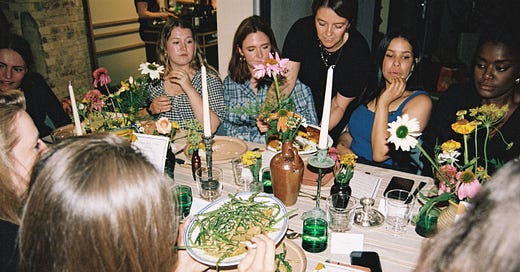I recently wrote a guest post for
’s brilliant Substack, The Dinner Party and it got me thinking about hosting (Rosie, I should add, is the dream hostess).I don’t think it’s an overstatement to describe hosting as an art. A dinner party is a delicate balancing act — one that requires you to balance people and personalities, deliver a menu that impresses yet welcomes, and create a vibe that is neither too raucous nor too subdued.
Orchestrating such an evening, and feeding a bunch of people, can quickly become stressful if the host hasn’t carefully considered and planned the very raison d’être of a dinner party: the menu.
Perhaps counterintuitively, the key to being a good host — a host that gets to enjoy their own party! — is to resist the temptation to do too much. This is easy enough to understand in principle, but take a moment to let the message sink in. I say this because it’s very human to want to show off, to peacock, to compete (hence the immense popularity of Come Dine With Me).
When I host a dinner party I’m fairly good at coming up with a sensible plan initially, but then something happens along the way: as the event nears the impulse to up the ante builds. Suddenly I’m contemplating adding a course to the menu, dehydrating the orange slices to go in the negronis, buying a whole new set of plates, making the bread from scratch and creating a new bespoke playlist specifically for this unique evening rather than simply re-using an old one. In short: I start over-complicating it (just me?!). You must resist the temptation (and by you, I really mean me) because when it comes to hosting less is — emphatically! — more.
I’m not suggesting that one approaches hosting a dinner party with a total lack of ambition. Having people over is a lovely opportunity to show a bit of flair. But the trick is to pick and choose your moments, rather than to go all-out in all areas. You have to make some courses or parts of the evening easier, so that you have the capacity to deliver the spectacular moments.
As someone who loves to host and has run supper clubs in their home, I’ve learnt a few tricks and some guiding principles for hosting effortlessly — and today I’m sharing them with you in a “don’t do that, do this” format.
Below are 5 bits of actionable advice for how to approach a dinner party, plus a bonus section on tablescaping that includes my favourite, forever chic and also cheap (!) cocktail glasses, plus the place where I get most of my tablecloths (I get asked this a lot). I hope all of this is useful as we head into this period of entertaining.
Love,
Alexina
1.
DON’T: Make everything from scratch
DO: Buy in the snacks — and the bread, and the fries, and the pastry
I’ve worked in professional kitchens and they do not make everything from scratch — far from it. The bread, the pastry, the fries, the snacks… most of these will be bought in. This is not about laziness: it’s smart. The more items you make from scratch the more your time and attention will be divided. You are better off spending the majority of your time nailing 2 to 3 key elements of a meal, rather than split it across 12.





